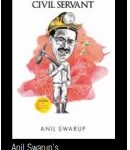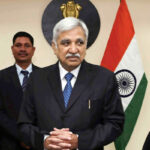- Cover Story
- Governance
- Globe Scan
- Corruption
- State Scan
- Talk Time
- Cover Story
- Governance
- Globe Scan
- Corruption
- State Scan
- Talk Time
Recent Posts
© Copyright 2007 - 2023 Gfiles India. All rights reserved powered by Creative Web INC. Anil Tyagi - Editor GfilesWritten by Gfiles Editor
Anil Tyagi - Editor GfilesWritten by Gfiles EditorAt a NITI Aayog meeting, Prime Minister Narendra Modi rightly said that the goal to make India a five-trillion-dollar economy was challenging, but achievable. In terms of democratic governance, there is a three-fold way to achieve this objective – increase incomes from farm and industry, spend massive amounts on infrastructure, and rev up the services sector to unleash the spirit of entrepreneurship and self-employment. Any economic spur, especially through an expansion of the internal markets, is provided by growth in small and medium businesses, in agriculture, manufacturing, and services. This, in turn, is dependent on just one factor – the creation of millions of jobs, regularly, year after year. This is why the goal is challenging. Over the past decade or so, the Indian economy has witnessed a loss of jobs, forget about an increase in employment. The sunrise sectors, driven largely by technology, are creating jobs but not to the extent required.
There is increasing evidence that job losses rather than employment creation is likely to become the norm. In manufacturing, the use of artificial intelligence and robotics implies that large projects require just a handful of people to manage operations. In agriculture, one will need to move in the directions of large farms, which are cultivated by machinery, not labour. Infrastructure and services too will increasingly require lesser number of humans to achieve higher productivity and revenues. If online retail takes off, there may even be lower employment in the retail sector.
Another dangerous trend is that the government, which hired large numbers, too is downsizing rapidly. For one, it is not filling the posts that are becoming vacant in key ministries and departments. For example, the postal department will not give jobs to anyone in a decade or so. Two, the ministries are outsourcing work, which implies that private contractors will extract more from lesser number of people and, thus, create less jobs. This will become an acute problem if the government, as stated, outsources 40 per cent of its work. Finally, the government’s vision these days is “minimum government, and maximum governance”, which means that it has saddled the private sector with the burden of creating new, much required, jobs.
So, what are the solutions? The first is that apart from a focus on large industries, a simultaneous approach is required to allow the small and medium-size sectors to grow rapidly. It cannot be done merely by giving arbitrary loans of Rs 1 million to small enterprises, which may turn into bad loans in the near future. The trick is to create an economic ecosystem to push entrepreneurship and self-employment. The second is to create an atmosphere for the labour-intensive segments to thrive. A few years ago, the annual Economic Survey rightly observed that the government has to encourage segments like textiles and leather.
Finally, the ruling regime has to prepare the nation, as also the present and future jobseekers, for tomorrow, and not for today. Hence, it has to enhance the existing skills of the people, and impart new skills that will be in demand for the next decade or two. Thus, the entire concept of Skill India has to change. One has to visualise how the various sectors and the inherent job markets will change over the next 10 years. Then, one has to work backwards to introduce training programmes accordingly. Economic disruptions, largely through technology, change the status quo dramatically. But they also create new and bigger opportunities. If India has to become a five-trillion-dollar economy, it has to wake up and smell the coffee.
Anil Tyagi
editor@gfilesindia.comRecent Posts
Related Articles
From the EditorFrom the Editor
Written by Anil Tyagi COVID-19 has devastated us socially, mentally, physically, and economically....
ByAnil TyagiMay 5, 2020From the EditorFrom the Editor
Written by Anil Tyagi COVID-19 is a virus, a physical being, howsoever miniscule,...
ByAnil TyagiMarch 4, 2020From the EditorFrom the Editor
Written by Anil Tyagi This is another face of capitalism, albeit an ugly...
ByAnil TyagiFebruary 5, 2020From the EditorFrom the Editor
Written by Anil Tyagi WHAT is governance? In modern parlance, it implies a...
ByAnil TyagiJanuary 7, 2020 - Governance
- Governance


























































